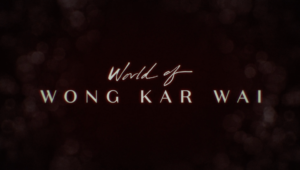
Written by Erin E. Fraser
I have never been to Hong Kong, and yet I have a sense for Hong Kong. A sense for its streets, a sense for its mood, a sense for its people. I have never been to Hong Kong, but I have seen the films of Wong Kar-wai.
Known for his vibrant, atmospheric romances and crime dramas, Wong’s films are best described as concentrated feelings rather than traditional, plot-driven cinema. His dazzling visuals—courtesy of a long-standing collaboration with idiosyncratic Australian cinematographer Christopher Doyle—and often non-linear narratives evoke a certain yearning and desire. He finds romance in the mundane, like when he’s able to make a dishcloth and a bar of soap into a metaphor for longing and unrequited love in Chungking Express. His superb use of popular music wrings new meaning out of Western pop songs, contrasting and recontextualizing them against the neon backdrop of Hong Kong’s crowded-yet-lonely streets.
Wong won the Best Director prize at the Cannes Film Festival in 1997 for Happy Together. In 2016 when the BBC polled 177 film critics from around the world to find out what they thought the 100 greatest films of the 21st Century were so far, Wong’s masterpiece In the Mood For Love came in second only to David Lynch’s Mulholland Drive and just ahead of Paul Thomas Anderson’s There Will Be Blood.
These six feature films and one short in Criterion’s World of Wong Kar-wai highlight some of Wong’s best work, including indelible performances from frequent collaborators Tony Leung, Maggie Cheung, and Andy Lau. Wong is constantly tinkering with his films, changing things here and there for different releases. It’s as if he is never completely satisfied with the “finished” versions and wants to keep returning to their worlds over and over. This collection of new restorations is no exception and he has said that the changes he has made here are to align with how he had originally envisioned the films. Unsurprisingly, there has been some debate over this choice. While some might see it as a betrayal of the original theatrical releases, I find it only adds to this sensation that his films are living, evolving things rather than static works of art. They exist in a liminal state, shifting and changing and mirroring the melancholy narratives they convey.
Wong Kar-wai makes films about the importance of human connection in a lonely world, something that feels especially relevant at the moment as we find ourselves physically separated from one another.
And I promise, you will never look at a dishcloth and a bar of soap the same way.
—

